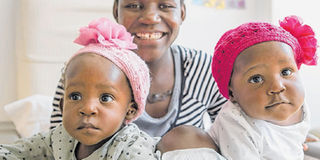Taboos weigh down twins as bad luck babies

A mother and her beautiful twins. In some societies and their traditions, twins are regarded as a sign of misfortune. PHOTO|FILE
What you need to know:
- Deeply entrenched norms among the residents of the district of Bukoba has compelled Mr Sebastian Rwebangira, 52, to believe that twin children can be a source of bad omen, certain illnesses in society and all sorts of catastrophes.
In biological science, twin children are known to be two offspring produced by the same pregnancy, however, for a section of the people in Bukoba, Kagera region, the meaning of twins goes far beyond the biological marvel.
Deeply entrenched norms among the residents of the district of Bukoba has compelled Mr Sebastian Rwebangira, 52, to believe that twin children can be a source of bad omen, certain illnesses in society and all sorts of catastrophes.
But, the story of the taboos associated with twins, as told by Mr Rwebangira, is not limited to people in Bukoba—elsewhere in the world, twins are not safe. They are subject to taboos that isolate and discriminate them, according to international media reports.
In a documentary aired on Channel 4, in the Unreported World Series (2014), a report of widespread misery amongst mothers and their twin children in Madagascar, captured the world attention.
[In the remote place], cyclone-battered south-east coast of Madagascar, where ancient taboos control every aspect of how people live their lives, among an ethnic group—the Antambahoaka—there is an extraordinary taboo: people believe that raising twins brings terrible misfortune, even death, says a report in the Huffington Post.
Twins tortured in Kagera with society’s beliefs
Your Health learnt of the existence of the same taboo here in Tanzania, when some people in Kagera region began pondering on the mysteries that surrounded the September 10 earthquake.
Elders in Bukoba, a rural district predominantly inhabited by the Bahaya tribe, say that apart from disasters, there are some illnesses that are spiritually attributed to the existence of twins in neighbourhoods.
Mr Rwebangira, the peasant in Bukoba’s rural settings, resides in Kabale village where twin children are believed to be the cause of a skin condition known medically as Vitiligo.
A victim of vitiligo—a long-term medical condition characterised by whitish patches of the skin, is believed to have been “cursed by twins” living either in the family or elsewhere the neighbourhoods.
Among the Bahaya tribe in the region, a victim of vitiligo is described as ‘Eyayokiibw’eirongo,’ literally meaning: one who was burnt and forsaken by twin children from his/her kinsfolk, so says Mr Mulisa Twaha, a resident of Bukoba.
Yet, the phobia and worship attached to twin children in the region is deeply-rooted that some residents have gone far beyond to associate them with this year’s September 10 earthquake that killed 19 people and caused mass destruction of infrastructure.
Mr Rwebangira says the beliefs have to do with the traditions that existed several years ago but are embraced even today.
He says, “Until today we still believe that if twins are angry, then the gods are angry as well. What comes next are natural calamities that affect not only our crops but also humanity, just like the earthquake did.”
Love and hate relationship associated with twins
Among the Bahaya traditions, twins are received with mixed feelings—of fear and joy, when they are born. Like in neighbouring Uganda, twins (abarongo), are perceived as gift from God but that does not rule out fear, says a paper published more than six years ago by Elsevier, a global source of scientific information.
According to the paper, titled: ‘Twin phobia among the Haya of Northwestern Tanzania,’ the use of the term ‘abarongo’ by the Bahaya seems ambiguous. On the one hand, it denotes ‘twins’ in the ordinary sense of two children born at the same time by the same mother.
However, on the other hand ‘abarongo’ also refers to children born in the breach position (kabunu), meaning, those who come from the womb with legs first instead of head first.
“Attributing one name to these two births suggests a kind of frustration in the minds of people regarding these children, who are considered abnormal,’’ says the paper, and adds, “Twins are to some extent regarded as a misfortune that has to be out- witted, lest the whole clan, and consequently the tribe, perish.”
Over the years, the general mentality about twins has been changing tremendously through modern influences, especially Christianity but some people still regard twins as abnormal children.
The Elsevier paper details how twins were treated before colonialism. ‘Before the Europeans came (to Buhaya), twins were usually killed because of the great fear that death might come to their parents and the whole family,’’ says the paper.
However, a section of the people in the region, such as Mr Jackson Mukwenda, adores twins and does not entertain the rituals associated with twins. He tells Your Health that in modern times, people shouldn’t be associating twins with natural calamities.
Mukwenda (56), a farmer in Kangoma village on the outskirts of Bukoba town, recalls that back in the history of the region, there were special huts in the Haya Traditions (ebigabiro) for conducting rituals whenever twins were born in his village.
Though, he admits there are societies where twins were thought to be evil and were subject to all sorts of bad names, such as maano—literally meaning “curse.”
Taboos paint a wrong picture
The Kagera Region’s Social Welfare Officer, Ms Rebecca Gwamasa, says that most of the traditions are still upheld but are practiced in secrecy.
In an incident that was widely reported last year, in Ngara District, Kagera Region, a man allegedly killed his wife following a belief that she had brought curse upon his family by giving birth to twins.
The then Kagera Regional Police Commander (RPC), Mr Henry Mwaibambe, said that Ms Sinzobi Bialabawa (24) delivered two healthy baby girls but her husband, Mlengela, allegedly assaulted her, killing her in the process, accusing her to have brought a curse.
In Kamashwa village, Izigo ward, Bukoba District, Ms Adela Ninsiimomukama (48), says she is discriminated against by people in her neighbourhood because she is suffering from vitiligo.
“I have grown up hearing that my condition was associated with the bad omen of twin children,” she says.
She tells Your Health that in her society, children are afraid of her white skin patches. “[The children] have been taught to believe that I can infect them with this condition. But doctors told me the condition cannot be transmitted to another person.”
Dr Kabibi Byabato, a pediatrician at Ndolage hospital in Muleba district, quells the belief. She explains that vitiligo is a purely scientific phenomenon, whereby skin cells fail to produce their own normal color.
She admits that in the society where she was raised, people have, since time immemorial, attributed the condition to taboos, such as those associated with twin children.
Dr Kabibi says, the taboos are painting a wrong picture about twins and misleads the society about the actual causes of vitiligo.
Ester Nyakato Majura(48), is a twin, and a resident of Kishoju village in Nshamba. She is irritated by the beliefs in her society. She recalls an incident when her aunt fell sick, and she was forced to perform rituals so that her aunt could get better.
Ester is now used to people’s perceptions of her. “Being a twin has taught me many things, including how to deal with people who perceive twins as people with spirits. I have become sort of immune to such bad treatment. I have gone through enough of the segregation and physical torture from people who consider a nearby twin as the cause of whatever problem,’’ she says.




